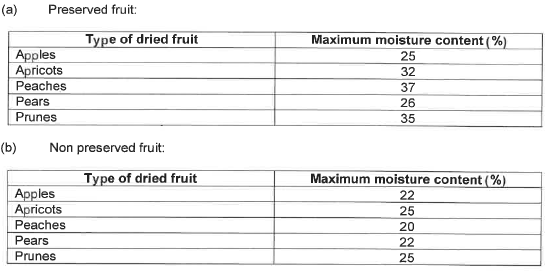| (1) |
Where used specifically with regard to dried deciduous fruit— |
with the regard to apples, means the physiological breakdown of cells under the skin, causing slight depressions generally concentrated at the calyx end of the fruit. The tissue in these depressed areas is darkened, dry and spongy;
with regard to prunes, means a thickening of or a hard thickened area on skin;
with regard to apples and pears, means the removal of the seed capsules and pips from the fruit;
with regard to apples, means a major disorder affecting the fruit, affected fruit have a hard lump in the pulp and dry acidic flesh, but have no external symptoms;
means—
| (i) |
callous-like growth scars of more than 10 mm; |
| (ii) |
cracks, slits or break down to the stone (pit); and |
| (iii) |
splits or breaks exposing a substantial part of the flesh and seriously affecting the appearance of the fruit; |
means apples, apricots, nectarines, peaches, pears, plums and prunes;
with regard to apples and pears, means—
| (i) |
pieces of skin exceeding an aggregate area of 144 mm2 adhering to the fruit unit; |
| (ii) |
bruises which have damaged the fruit to such an extent that its appearance, edibility or keeping quality is affected detrimentally : Provided that light brown bruises shall not be considered as defects; |
| (iii) |
remains of calyxes adhering to the fruit unit; |
| (iv) |
bitter pit or other corky tissue in the dried unit exceeding an aggregate area of 144 mm2 ; or |
| (v) |
the occurrence of water core on more than one quarter of the area of the dried fruit unit or the presence thereof to such an extent that the appearance, edibility or keeping quality is affected detrimentally; |
means cut fruits which are not symmetrical or cleanly cut, including torn halves: Provided that the original shape of the cut or torn fruit is retained and shall not deviate more than 6 mm from the fruit seam;
in the case of prunes mean cracks or splits which exceed 10 mm in length, excluding destoning holes, which are markedly calloused, or which detract markedly from the appearance of the prunes;
in the case of prunes mean cracks or splits less than 10 mm in length, excluding destoning holes, which are not markedly calloused, of which the callous is not cracked and which does not markedly detract from the appearance of the prunes;
means peaches with loose stone (pit), clingstone and nectarines;
with regard to apples and pears, means pieces of core exceeding 49 mm2 in aggregate area attached to the dried fruit units;
with regard to apple rings and apple segments , means pieces which will readily pass through a sieve of 16 mm mesh;
with regard to apples, means a physiological disorder characterised by water-soaked tissue around the vascular bundles or core area due to the spaces between cells becoming filled with fluid instead of air. Affected tissue is water-soaked and glassy looking; and
means rings or portions of rings which shall be cut or broken, but which consist of at least three quarters of the original whole rings.
The maximum moisture content for the various dried deciduous fruit products is as follows:

| (3) |
In addition to the general quality standards set out in regulation 5, dried deciduous fruit shall also comply with the following requirements: |
| (a) |
Choice Grade deciduous fruit shall have a good texture and a bright colour, typical of the variety concerned and the colour within the same container shall be uniform. |
| (b) |
Standard Grade deciduous fruit shall have a reasonably good texture and a reasonably bright colour, typical of the variety concerned and colour within the same container shall be reasonably uniform. |
(4) The following quality factors shall be used to determine the grade for each dried deciduous fruit product concerned:
| (e) |
Extraneous vegetable matter. |
 Complete Occupational Health & Safety COVID-19 Plan
Complete Occupational Health & Safety COVID-19 Plan
